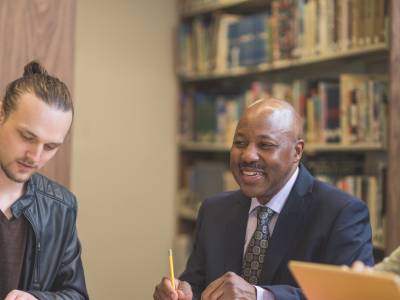Advice for foreign lawyers coming to the U.S. to get graduate degrees (both LL.M & JD)
First piece of advice: Prepare, prepare, prepare
By Johana on Apr 28, 2008
By now, most foreign applicants to LL.M (or JD) programs in the U.S. have heard whether they got accepted into the program(s) they applied to. If that is your case, (and the news was good) congratulations! Getting accepted to an LL.M (or JD) program is an accomplishment in and of itself, and is one that will surely prove to be very rewarding on a number of different levels in the months and years to come.
Now that the first big hurdle has been overcome (you are in after all!), you may be wondering: Now what?
At this stage, many accepted students wonder how to best plan their trip, what they'll need to do once they get to their destinations, etc. Most law schools provide accepted students with comprehensive binders full of information on the school, a listing of available classes, booklets on what the city is like and jam-packed orientation schedules. All of which is very helpful (and greatly appreciated) but often, not nearly enough.
Given that taking a year "leave" from their regular lives and jobs is such a big (and logistically complex) step, most students focus all their energy on what they need to do to physically get to the U.S. (fill out the paperwork, get visas, coordinate flights and initial stay, get an apartment, set-up accounts to have access to their funds, pick what they are going to bring, say goodbye to their friends, etc.). Some even contact their future classmates, in an effort to learn a little bit about who they will be spending the next year with and establish rapport before the get-go.
Most, however, don't think about preparing for the actual coursework and the challenges of learning advanced law in a completely different system (and for many, a completely different language).
Some think about it but feel they don't need to prepare. After all, they are accomplished lawyers in their home countries and did very well during law school the first time around. The fact that they already are stellar lawyers should be an advantage, right? Well, for many that is not necessarily the case. Particularly for lawyers trained under Civil Law (i.e. based on Roman law) due to the big differences between systems.
I speak from experience. As a Colombian lawyer (Colombia's legal system, like most countries', is rooted in Roman Law), I was not expecting the "legal culture shock" I got during my first semester at Northwestern. Although a lot of the substantive concepts were similar and some of the terminology was familiar, the way issues were "spotted" and analyzed was simply completely foreign (and often counter-intuitive) to me. (Even with subjects I taught prior to coming to the U.S.!). At first, I thought there was something wrong with me. Then, I looked around and talked to a number of my fellow foreign classmates, and realized we were all pretty much lost... and making up a system as we plowed on and stayed up late struggling with our reading.
I eventually figured it out, and thankfully, did very well. But it took me (as it takes most of the foreign law students I know and have spoken to over the years) a full semester to "get it."
Because I was coursing the 2-year JD at Northwestern, luckily, I had time to fully take advantage of the time I had left, but to this day I wish I had known what to expect and how to tackle it before my first day of class. I have heard most of my peers (both JD and LL.M) say the same thing, particularly the LL.Ms, since their program lasts only 1 year.
So my first piece of advice for all of you newly admitted students out there (particularly Civil lawyers) is prepare, prepare, prepare. Learn as much as you can about the classes you will be taking, the method of teaching and grading, how to manage case law, how to prepare for class, etc. Contact LL.M alumni from the program you'll be attending and get their take. Read about how the systems differ and how issues are analyzed under each. In sum, get a sense for what the academic experience will be like and what is expected of you before you set foot in your first class.
Cheers and good luck! Johana
Johana Mantilla Gómez has a JD from Northwestern Universisty & an LL.B from Pontificia Universidad Javeriana. She currently shares her thoughts and experience through LL.M Studio, a resource for foreign lawyers thinking about pursuing graduate legal studies in the U.S. For more info, please see Johana's LL.M Guide profile (www.llm-guide.com/about/Johana) or her lawyrs.net profile (www.lawyrs.net/profile/johana-m-gomez).
Second piece of advice: What the New York Times, a good TOEFL score and John Grisham all have in common - They will help you do better during your LL.M/JD
By Johana on May 19, 2008
Let’s face it. One of the biggest hurdles non-native English speakers encounter during their LL.M/JD programs is breaching the language barrier. And by breaching it I don’t mean being able to converse with others in the subway or getting through the latest edition of Time Magazine.What I mean is being able to participate in class when called upon by professors and, more importantly, being able to complete extensive and complex reading assignments which are hard to get through even for native speakers.
It is not uncommon for some incoming students to focus on getting high TOEFL scores to get into the programs of their choice, and then forgetting about their English skills altogether until they get to the U.S. to start their programs. Others expect that because they are fluent, they do not need to think about their English proficiency until they go to their first class. I beg to differ.
Don’t get me wrong, a good TOEFL score is an important tool and a good check on what your proficiency level is. However, there is more to it than what the score alone reveals.
Throughout the course of your program, you will encounter plenty of situations where your comfort level with English will highly impact your performance. To give you an idea, most classes require out-of-class preparation which, as mentioned, often involves extensive reading assignments. (It is estimated that for every hour of class 3 to 4 hours of out-of-class study are required for native speakers). These classes are structured around the idea that students will cover the assigned reading material in advance of the in-person session, during which the professor will succinctly cover the reading (by asking students to summarize it verbally) and will touch upon the most important issues that need to be taken away for that particular topic. By engaging in Socratic conversation, students are encouraged to think about the issues for themselves, develop what I call a “legal radar” to spot legal issues, and think of plausible arguments for all parties involved.
As you can imagine, being able to understand the concepts covered in the reading and articulate them in a way that makes sense to your professor is critical for your success during the program. This will be particularly important during your final examinations which, in certain schools, can account for 100% of your grade. (Note that as stressful as in-class participation (also known as “cold-calling”) can be, it is often ungraded; so even if you struggle a bit during the verbal presentation of the facts of a case and muddle up the issues, nothing will suffer, except perhaps, your ego... So no need to worry too much about this, as you will soon discover that many of your classmates will be in a very similar situation).
Your English proficiency will also be critical during the job hunt process. Unless you are able to effectively communicate with potential employers during the interviewing process, your prospects of getting a position in the U.S. may suddenly look quite slim.
So my advice to you is, don’t underestimate the importance of your English skills. Don’t wait until you arrive at the airport to start thinking, reading and speaking in English. In advance of your program, try picking up some legal reading (articles, law reviews, etc.) a John Grisham novel (other legal thrillers will also do and will keep your preparation interesting) and/or a copy of the New York Times or the Wall Street Journal. Also, try to make time to watch the news and e-mail/speak to friends in English. If still rusty, think about taking some courses to get you up-to-speed. This will help you “warm-up” before you leave home.
Once you have started you program, I advice you not to limit your circle of friends to students who speak your same language or, if you do, make an effort to speak in English amongst yourselves. This will make the experience more interesting (as you meet people from all around the world) and will keep you thinking in-language.
For purposes of your graduate program and for your future practice, one of the most valuable assets you can cultivate is the ability to communicate effectively with colleagues, counterparts and clients in English. That is what motivated many of you to pursue an LL.M/JD degree in the first place. And although your graduate program will help you (and sometimes even force you) to advance that agenda, starting ahead of the game never hurts! It will in fact enhance your entire experience.
*Johana Mantilla Gómez has a JD from Northwestern University & an LL.B from Pontificia Universidad Javeriana. She currently shares her thoughts and experience through LL.M Studio, a resource for foreign lawyers thinking about pursuing graduate legal studies in the U.S. For more info, please see Johana's LL.M Guide profile (www.llm-guide.com/about/Johana) or her lawyrs.net profile (www.lawyrs.net/profile/johana-m-gomez).
A Common Pitfall by Foreign Law Students: Over-Confidence
By Johana on Jan 28, 2011
(As a foreword, wow, it has been a long time since I last published something here. I am very happy to be back!)
Now, on to the blog.
Recently, looking to further inform my thinking on what might help foreign law students do well during their programs, I've been spending a lot of time reading blogs, articles and books advising American JDs on what to expect.
Although these books are not targeted to foreign students, I figured some of the same advice should apply. After all, a law student is a law student. Right?
Wrong, as it turns out.
Something that strikes me as interesting is that these resources tend to focus (rather copiously, I might add) on how to alleviate incoming student's anxiety about the experience that awaits them.
What is interesting to me is not that incoming American JD students are stressed out about starting law school (that seems completely logical to me), but the fact that foreign law students tend to come into the experience entirely at ease.
As I recall from observing incoming LL.Ms during my law school days at Northwestern (and as confirmed by many of the alumni I have interviewed over the years), incoming LL.M students(1) tend to feel confident (or let me rephrase, overly confident) about how well they'll do during their programs. After all, they've already gone to law school, right?
So, they come into the first day of class (generally after either skipping orientation, or spacing out during the sessions) feeling self-assured and stress-free.
For the first few weeks, you can see them chatting amicably with their classmates over lunch and strolling leisurely through the campus grounds. What a contrast from their JD counterparts! (And from how they themselves look only a few weeks later, unfortunately).
Don't get me wrong; there is nothing bad about feeling confident about yourself and your abilities. Hey, I am a firm believer in cultivating one's self-esteem.
But time and time again, LL.M alumni mention that, in retrospect, they came in thinking the program was going to be a breeze, or that based on their previous success at home (both academically and professionally) they weren't going to struggle --and time and time again, they are proven wrong.
Many recall that at the outset their thinking went along the lines of "Worry? About what? Leave that to the inexperienced JDs. I'm already a lawyer (a successful lawyer, in fact) elsewhere. I have been through law school before. How different can it be?"
Well, particularly if you are a Civil Lawyer, how about very different.
In fact, LL.M alumni from Civil Law traditions tend to report that they felt as though they were learning the law for the first time, due to the striking differences in approach and analysis of legal issues.
It's not that students don't ultimately get it. They do, and in fact, some end up getting high marks. (A brief aside: one of the rarely mentioned benefits of having a single, end-of-term examination that accounts for 100% of your grade is that you have a little wiggle room to figure things out before you are actually graded).
It's the confusion (and eventually, apprehension) students must endure until they finally get it.
But what exactly is there to get?
The first thing to know is that coming to the experience a little more humbly and a lot more open to actually discovering something new about the law is an essential part of the learning process.
Also, it helps to know that (at first) you'll probably have to set aside much of your previous training and knowledge to make room for those new learnings to set in. Letting go of what you know and actually being open to learning from scratch helps understand case law and common law reasoning much more effectively. (Of course, once you have gone through the LL.M, you'll be able to integrate all you know into a comprehensive landscape that incorporates what you brought to the table prior to the program).
So, if you are a Civil Lawyer who's about to embark on an LL.M program this year, here's a word of advice from countless others who have gone before you: Sure, you are a successful lawyer at home; yes, you know your stuff (heck, you may even be a Law professor at home) but don't be taken aback if the course work is a bit more challenging (and the approach to issues very different) from what you are expecting it to be.
I'm not advocating fear or anxiety, by any means; that would be silly.
What I do encourage is an openness to be surprised by an entirely different approach to the law, which may turn out to be as counter-intuitive as it is interesting.
In other words, approach the experience of getting your LL.M as an actual opportunity to learn and a unique chance to view the law from a different perspective, instead of merely seeing it as a vehicle to boost your credentials.
If you do, you'll walk away with way more than a degree. You'll walk away a changed lawyer.
(1) A note: The above is more applicable to LL.M students than it is to foreign JD students. Foreign students pursuing a US JD tend to approach the experience much more like their American classmates.
*Johana M. Gomez has a JD from Northwestern University & an LL.B from Pontificia Universidad Javeriana. She shares her thoughts and experience through LL.M Studio, a resource for foreign lawyers thinking about pursuing graduate legal studies in the U.S. For more info, please see Johana's LL.M Guide profile (http://www.llm-guide.com/about/Johana) or her lawyrs.net profile (http://www.lawyrs.net/profile/johana-m-gomez).
LLM News
LLM Articles
Why Tech Law is the Hot New LL.M. Focus in an AI Era
Nov 14, 2024
Schools are helping lawyers prepare for a fast-changing legal world impacted by AI and developing technology. Students can benefit from a cutting-edge curriculum and new job opportunities.
Connect with Top California Law Schools
Nov 07, 2024
The California Law LL.M. Consortium is giving prospective students in Milan and London the opportunity to meet school and admissions representatives. They will hear about top legal issues and learn about how a U.S. LL.M. can benefit their careers.
Leaping Back into Firm Life After an LL.M.
Nov 05, 2024
Leaving school behind can feel daunting but if a graduate understands the different expectations and is conscious of new technology, it can make returning to a firm that much easier.
Making the Most of Your LL.M.: Why Extracurricular Groups Matter
Oct 28, 2024
Activities outside class time can give students a more well-rounded experience during their degree. They can build crucial skills and expand a student's network to benefit their post-school life.













